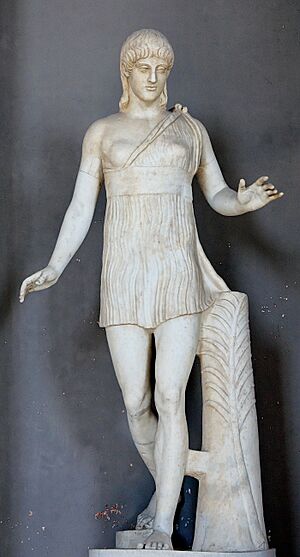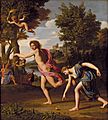Atalanta facts for kids
Atalanta (pronounced Ah-tah-LAN-tah) is a famous character from Greek mythology. She was known for being a very fast runner and a skilled huntress who loved the outdoors.
Atalanta's story begins in Arcadia, a region in ancient Greece. Her father, King Iasus, really wanted a son. When Atalanta was born, he was disappointed and left her alone on a mountaintop. Luckily, a mother bear found her and raised her. Later, she was found by hunters and grew up to be a strong and independent young woman. Eventually, she reunited with her father.
Contents
Who Was Atalanta?
Atalanta was unique because she preferred hunting and adventure over traditional roles for women in ancient Greece. She was incredibly fast and strong, often outperforming men in physical challenges. She was also known for choosing to remain unmarried for a long time.
A Skilled Huntress
Atalanta became famous for her amazing hunting skills. She was a master with the bow and arrow, and no animal could escape her.
The Calydonian Boar Hunt
One of Atalanta's most famous adventures was joining the hunt for the Calydonian Boar. This was a giant, dangerous boar sent by the goddess Artemis to cause trouble. Many heroes from all over Greece joined the hunt. Atalanta was the first to wound the boar, showing her bravery and skill. The hero Meleager eventually killed it, but he gave the boar's skin to Atalanta as a prize, recognizing her important role.
Wrestling Peleus
Atalanta also took part in funeral games held for King Pelias. During these games, she wrestled the hero Peleus, who was the father of Achilles. Atalanta managed to defeat Peleus in the wrestling match, proving her strength and athletic ability once again.
The Famous Footrace
Atalanta was so fast that she vowed to marry only someone who could beat her in a footrace. If a suitor lost, they would face a harsh punishment. Many young men tried, but none could match her speed.
The Golden Apples
A young man named Hippomenes fell in love with Atalanta and wanted to marry her. Knowing he couldn't win by speed alone, he asked the goddess Aphrodite for help. Aphrodite gave him three shining golden apples. During the race, as Atalanta pulled ahead, Hippomenes would cleverly toss one of the golden apples to the side. Atalanta, curious about the beautiful apples, would stop to pick them up, allowing Hippomenes to gain a lead.
A Surprising Ending
Hippomenes used all three apples, and each time Atalanta stopped to pick one up, he got closer to the finish line. In the end, he managed to win the race. Atalanta kept her promise and married Hippomenes. However, their story took an unexpected turn. They angered a god by entering a sacred place, and as a punishment, they were both transformed into lions.
Images for kids
-
Black-figure pottery showing a wrestling match between Peleus and Atalanta during the funerary games of King Pelias. In the background, the prize of the duel: the skin and the head of the Calydonian boar.
-
Oil painting depicting the footrace between Hippomenes and Atalanta by Noël Hallé, housed in the Louvre Museum.
-
Oil painting of Atalanta and Meleager hunting the Calydonian boar (Jan Fyt, 1648). The Ringling, Bequest of John Ringling, 1936.
-
Meleager et Atalanta, from a drawing by Giulio Romano, engraved by François Louis Lonsing. Atalanta is at far left with bow; Meleager is right of her, spearing the Calydonian boar (1773).
-
Atalanta and Meleager hunting the Calydonian boar. Woodcut by Giovanni Battista Palumba, print in the British Museum.
See also
 In Spanish: Atalanta para niños
In Spanish: Atalanta para niños
 | Sharif Bey |
 | Hale Woodruff |
 | Richmond Barthé |
 | Purvis Young |












